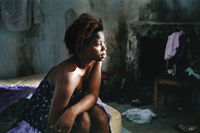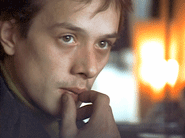 La Blessure, 2004. The film opens to an unhurried, long take, static shot of a man lying near motionless on the mattress on the floor of a cramped, dingy apartment, seemingly waiting for something to happen. The ringing of a telephone breaks the visual monotony of the frame as a man named Papi (Adama Doumbia) crosses in front of the camera to answer the call and upon hearing that his wife Blandine’s plane has arrived at Charles de Gaulle Airport, leaves the apartment to meet her. Meanwhile, Blandine (Noëlla Mossaba) and several other non-native passengers have been detained by the police behind the locked doors of an undisclosed location within the back rooms of the airport for improper documentation. Pleading to no avail of their intention to file for asylum, the undocumented immigrants are held for hours at the holding facility, unable to contact their loved ones (and who, in turn, are cursorily driven away by officials claiming that there is no record of them having even arrived at the airport), withheld food, drink, and hygiene facilities, and subjected to humiliating strip searches, intrusive health examinations, and interrogations before being forcibly scuttled under the cloak of darkness into a crowded transportation van for placement into planes flying back to their native country. However, in the officers’ barbaric haste to install the detainees surreptitiously into the van before the arrival of the airport travelers at the gate for boarding, Blandine’s leg becomes trapped in the prematurely closed doors of the vehicle, aborting their attempts to load the passengers onto the plane for immediate deportation. Returned to their cramped holding facility, a representative from the Ministry of Foreign Affairs on a routine spot-check of the airport observes the obvious mistreatment of the detainees and decides to intervene on their behalf, coaching them on the proper channels of contact to petition for asylum, insisting that Blandine be sent to a hospital for proper medical assistance, and filing a report to his superiors on the inhumane treatment of the asylum seekers that he has witnessed. The representative eventually succeeds in obtaining a last-minute faxed injunction to stop the deportation of the detainees (after receiving a blunt reproach from his supervisor not to continue to overstep his jurisdiction over the immigration office), and soon, Blandine and Papi are reunited. Nevertheless, the trauma of her detention continues to haunt Blandine in her new life as her optimism, geniality, and resolve give way to psychological inertia, estrangement, and enigmatic silence. Inviting favorable comparison to the overtly political, social realist films of Jean-Pierre and Luc Dardenne, La Blessure is an understatedly affecting, acutely observed, and profoundly sobering portrait of oppression, dehumanization, and exclusion. By incorporating organic, extended plan-sequences and using repeated images of interminable waiting – from Blandine’s detention, to her self-confinement at a derelict tenement, to Papi’s real-time ride through the countryside in the back of day laborer truck – Nicolas Klotz reflects the inherent inadequacy (if not outright failure) of immigration and asylum laws, lax procedural structure, and government-tolerated, often racially motivated policies (and undocumented, obstructive common practices) that willfully hinder or impede the integration and assimilation of immigrants into their adoptive countries. Using the treatment of Blandine’s wound while in French custody as a metaphor for the authorities’ repeated turning of a blind eye to the obvious, visible social problem, the film serves as a harrowing and trenchant exposition on intolerance and systematic marginalization.
La Blessure, 2004. The film opens to an unhurried, long take, static shot of a man lying near motionless on the mattress on the floor of a cramped, dingy apartment, seemingly waiting for something to happen. The ringing of a telephone breaks the visual monotony of the frame as a man named Papi (Adama Doumbia) crosses in front of the camera to answer the call and upon hearing that his wife Blandine’s plane has arrived at Charles de Gaulle Airport, leaves the apartment to meet her. Meanwhile, Blandine (Noëlla Mossaba) and several other non-native passengers have been detained by the police behind the locked doors of an undisclosed location within the back rooms of the airport for improper documentation. Pleading to no avail of their intention to file for asylum, the undocumented immigrants are held for hours at the holding facility, unable to contact their loved ones (and who, in turn, are cursorily driven away by officials claiming that there is no record of them having even arrived at the airport), withheld food, drink, and hygiene facilities, and subjected to humiliating strip searches, intrusive health examinations, and interrogations before being forcibly scuttled under the cloak of darkness into a crowded transportation van for placement into planes flying back to their native country. However, in the officers’ barbaric haste to install the detainees surreptitiously into the van before the arrival of the airport travelers at the gate for boarding, Blandine’s leg becomes trapped in the prematurely closed doors of the vehicle, aborting their attempts to load the passengers onto the plane for immediate deportation. Returned to their cramped holding facility, a representative from the Ministry of Foreign Affairs on a routine spot-check of the airport observes the obvious mistreatment of the detainees and decides to intervene on their behalf, coaching them on the proper channels of contact to petition for asylum, insisting that Blandine be sent to a hospital for proper medical assistance, and filing a report to his superiors on the inhumane treatment of the asylum seekers that he has witnessed. The representative eventually succeeds in obtaining a last-minute faxed injunction to stop the deportation of the detainees (after receiving a blunt reproach from his supervisor not to continue to overstep his jurisdiction over the immigration office), and soon, Blandine and Papi are reunited. Nevertheless, the trauma of her detention continues to haunt Blandine in her new life as her optimism, geniality, and resolve give way to psychological inertia, estrangement, and enigmatic silence. Inviting favorable comparison to the overtly political, social realist films of Jean-Pierre and Luc Dardenne, La Blessure is an understatedly affecting, acutely observed, and profoundly sobering portrait of oppression, dehumanization, and exclusion. By incorporating organic, extended plan-sequences and using repeated images of interminable waiting – from Blandine’s detention, to her self-confinement at a derelict tenement, to Papi’s real-time ride through the countryside in the back of day laborer truck – Nicolas Klotz reflects the inherent inadequacy (if not outright failure) of immigration and asylum laws, lax procedural structure, and government-tolerated, often racially motivated policies (and undocumented, obstructive common practices) that willfully hinder or impede the integration and assimilation of immigrants into their adoptive countries. Using the treatment of Blandine’s wound while in French custody as a metaphor for the authorities’ repeated turning of a blind eye to the obvious, visible social problem, the film serves as a harrowing and trenchant exposition on intolerance and systematic marginalization.
 Paria, 2000. Paria opens to a Felliniesque shot of a man suspended between earth and sky: in this case, a vagrant – perhaps under the influence – swinging from pipes along the walls of a subway station tunnel. But rather than a metaphor for the struggle between the body and the soul, the suspended state in Paria is one of social uncertainty – a sense of limbo that is also reflected in the disembodied, back of the head shot of a state worker seemingly floating as he looks out from the windshield of a social services van, cruising the evening streets in search of homeless people to transport to the local shelter. The first installment in what would become Nicolas Klotz and screenwriter Elizabeth Perceval’s provocative and impassioned trilogy of modern times (along with La Blessure and La Question humaine) – named in homage to Charlie Chaplin’s Modern Times, a satire on mass production (and by extension, the Industrial Revolution of the late 1800s) – Paria also presents a collective portrait of lives that have been figuratively caught within the cogs of a monolithic, dehumanized system at the turn of the century. One such story is Victor (Cyril Troley), a farmer’s son who moved to Paris in search of better job opportunities, only to end up living at a tenement (and makeshift hair salon) eking out an existence as a video store courier. Already behind on his rent, his circumstances become even more precarious when his motorcycle is stolen during a visit with friends. Another story is cocky, silver-tongued Momo (Gérald Thomassin), a homeless young man who spends his idle hours prowling commuter stations. Presented with an opportunity to earn some money by entering into a paper marriage, he begins to insinuate himself into his prospective bride’s bemused family.
Paria, 2000. Paria opens to a Felliniesque shot of a man suspended between earth and sky: in this case, a vagrant – perhaps under the influence – swinging from pipes along the walls of a subway station tunnel. But rather than a metaphor for the struggle between the body and the soul, the suspended state in Paria is one of social uncertainty – a sense of limbo that is also reflected in the disembodied, back of the head shot of a state worker seemingly floating as he looks out from the windshield of a social services van, cruising the evening streets in search of homeless people to transport to the local shelter. The first installment in what would become Nicolas Klotz and screenwriter Elizabeth Perceval’s provocative and impassioned trilogy of modern times (along with La Blessure and La Question humaine) – named in homage to Charlie Chaplin’s Modern Times, a satire on mass production (and by extension, the Industrial Revolution of the late 1800s) – Paria also presents a collective portrait of lives that have been figuratively caught within the cogs of a monolithic, dehumanized system at the turn of the century. One such story is Victor (Cyril Troley), a farmer’s son who moved to Paris in search of better job opportunities, only to end up living at a tenement (and makeshift hair salon) eking out an existence as a video store courier. Already behind on his rent, his circumstances become even more precarious when his motorcycle is stolen during a visit with friends. Another story is cocky, silver-tongued Momo (Gérald Thomassin), a homeless young man who spends his idle hours prowling commuter stations. Presented with an opportunity to earn some money by entering into a paper marriage, he begins to insinuate himself into his prospective bride’s bemused family.
Proceeding in flashback, the interconnected plight of Momo and Victor (who is first seen struggling with him, resisting attempts to be loaded into the van) seems destined – a fatedness that is revealed in an earlier episode in which Momo steals Victor’s shoes after he falls asleep on a train platform, in essence, demonstrating their physical – and socioeconomic – interchangeability. The shot of an African immigrant girl passing Victor in a hallway illustrates another point of intersection among the disenfranchised, alluding to a sense of shared station (note a similar passing encounter in La Question humaine in the interstitial image of immigrants – including Adama Doumbia from La Blessure – being targeted by police for a random identification check). Similarly, Momo and Victor’s encounter with an ailing homeless man, Blaise (Didier Berestetsky) on New Year’s Eve seems fated, bound by the community of resigned marginalization. Within this context, Victor’s search for Annabelle (Morgane Hainaux) in a crowded café and Momo’s celebration of his nuptials also represent a paradoxical juncture, converging towards a fleeting glimpse of respite and normalcy, even as they reinforce their increasing distance from them.
Acquarello, 2005-2009 [reprinted]